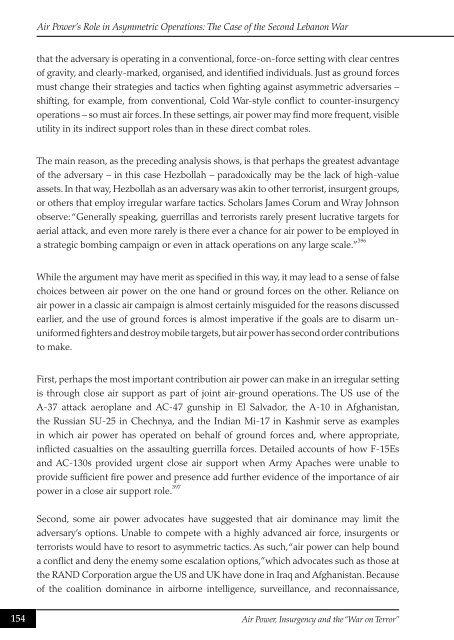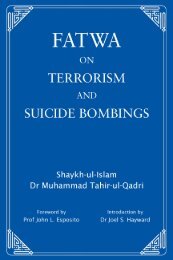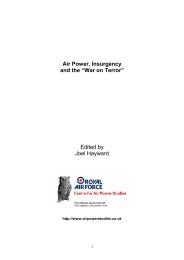Air Power, Insurgency and the âWar on Terrorâ - Prof. Joel Hayward's ...
Air Power, Insurgency and the âWar on Terrorâ - Prof. Joel Hayward's ...
Air Power, Insurgency and the âWar on Terrorâ - Prof. Joel Hayward's ...
Create successful ePaper yourself
Turn your PDF publications into a flip-book with our unique Google optimized e-Paper software.
<str<strong>on</strong>g>Air</str<strong>on</strong>g> <str<strong>on</strong>g>Power</str<strong>on</strong>g>’s Role in Asymmetric Operati<strong>on</strong>s: The Case of <str<strong>on</strong>g>the</str<strong>on</strong>g> Sec<strong>on</strong>d Leban<strong>on</strong> War<br />
that <str<strong>on</strong>g>the</str<strong>on</strong>g> adversary is operating in a c<strong>on</strong>venti<strong>on</strong>al, force-<strong>on</strong>-force setting with clear centres<br />
of gravity, <str<strong>on</strong>g>and</str<strong>on</strong>g> clearly-marked, organised, <str<strong>on</strong>g>and</str<strong>on</strong>g> identified individuals. Just as ground forces<br />
must change <str<strong>on</strong>g>the</str<strong>on</strong>g>ir strategies <str<strong>on</strong>g>and</str<strong>on</strong>g> tactics when fighting against asymmetric adversaries –<br />
shifting, for example, from c<strong>on</strong>venti<strong>on</strong>al, Cold War-style c<strong>on</strong>flict to counter-insurgency<br />
operati<strong>on</strong>s – so must air forces. In <str<strong>on</strong>g>the</str<strong>on</strong>g>se settings, air power may find more frequent, visible<br />
utility in its indirect support roles than in <str<strong>on</strong>g>the</str<strong>on</strong>g>se direct combat roles.<br />
The main reas<strong>on</strong>, as <str<strong>on</strong>g>the</str<strong>on</strong>g> preceding analysis shows, is that perhaps <str<strong>on</strong>g>the</str<strong>on</strong>g> greatest advantage<br />
of <str<strong>on</strong>g>the</str<strong>on</strong>g> adversary – in this case Hezbollah – paradoxically may be <str<strong>on</strong>g>the</str<strong>on</strong>g> lack of high-value<br />
assets. In that way, Hezbollah as an adversary was akin to o<str<strong>on</strong>g>the</str<strong>on</strong>g>r terrorist, insurgent groups,<br />
or o<str<strong>on</strong>g>the</str<strong>on</strong>g>rs that employ irregular warfare tactics. Scholars James Corum <str<strong>on</strong>g>and</str<strong>on</strong>g> Wray Johns<strong>on</strong><br />
observe: “Generally speaking, guerrillas <str<strong>on</strong>g>and</str<strong>on</strong>g> terrorists rarely present lucrative targets for<br />
aerial attack, <str<strong>on</strong>g>and</str<strong>on</strong>g> even more rarely is <str<strong>on</strong>g>the</str<strong>on</strong>g>re ever a chance for air power to be employed in<br />
a strategic bombing campaign or even in attack operati<strong>on</strong>s <strong>on</strong> any large scale.” 396<br />
While <str<strong>on</strong>g>the</str<strong>on</strong>g> argument may have merit as specified in this way, it may lead to a sense of false<br />
choices between air power <strong>on</strong> <str<strong>on</strong>g>the</str<strong>on</strong>g> <strong>on</strong>e h<str<strong>on</strong>g>and</str<strong>on</strong>g> or ground forces <strong>on</strong> <str<strong>on</strong>g>the</str<strong>on</strong>g> o<str<strong>on</strong>g>the</str<strong>on</strong>g>r. Reliance <strong>on</strong><br />
air power in a classic air campaign is almost certainly misguided for <str<strong>on</strong>g>the</str<strong>on</strong>g> reas<strong>on</strong>s discussed<br />
earlier, <str<strong>on</strong>g>and</str<strong>on</strong>g> <str<strong>on</strong>g>the</str<strong>on</strong>g> use of ground forces is almost imperative if <str<strong>on</strong>g>the</str<strong>on</strong>g> goals are to disarm ununiformed<br />
fighters <str<strong>on</strong>g>and</str<strong>on</strong>g> destroy mobile targets, but air power has sec<strong>on</strong>d order c<strong>on</strong>tributi<strong>on</strong>s<br />
to make.<br />
First, perhaps <str<strong>on</strong>g>the</str<strong>on</strong>g> most important c<strong>on</strong>tributi<strong>on</strong> air power can make in an irregular setting<br />
is through close air support as part of joint air-ground operati<strong>on</strong>s. The US use of <str<strong>on</strong>g>the</str<strong>on</strong>g><br />
A-37 attack aeroplane <str<strong>on</strong>g>and</str<strong>on</strong>g> AC-47 gunship in El Salvador, <str<strong>on</strong>g>the</str<strong>on</strong>g> A-10 in Afghanistan,<br />
<str<strong>on</strong>g>the</str<strong>on</strong>g> Russian SU-25 in Chechnya, <str<strong>on</strong>g>and</str<strong>on</strong>g> <str<strong>on</strong>g>the</str<strong>on</strong>g> Indian Mi-17 in Kashmir serve as examples<br />
in which air power has operated <strong>on</strong> behalf of ground forces <str<strong>on</strong>g>and</str<strong>on</strong>g>, where appropriate,<br />
inflicted casualties <strong>on</strong> <str<strong>on</strong>g>the</str<strong>on</strong>g> assaulting guerrilla forces. Detailed accounts of how F-15Es<br />
<str<strong>on</strong>g>and</str<strong>on</strong>g> AC-130s provided urgent close air support when Army Apaches were unable to<br />
provide sufficient fire power <str<strong>on</strong>g>and</str<strong>on</strong>g> presence add fur<str<strong>on</strong>g>the</str<strong>on</strong>g>r evidence of <str<strong>on</strong>g>the</str<strong>on</strong>g> importance of air<br />
power in a close air support role. 397<br />
Sec<strong>on</strong>d, some air power advocates have suggested that air dominance may limit <str<strong>on</strong>g>the</str<strong>on</strong>g><br />
adversary’s opti<strong>on</strong>s. Unable to compete with a highly advanced air force, insurgents or<br />
terrorists would have to resort to asymmetric tactics. As such, “air power can help bound<br />
a c<strong>on</strong>flict <str<strong>on</strong>g>and</str<strong>on</strong>g> deny <str<strong>on</strong>g>the</str<strong>on</strong>g> enemy some escalati<strong>on</strong> opti<strong>on</strong>s,” which advocates such as those at<br />
<str<strong>on</strong>g>the</str<strong>on</strong>g> RAND Corporati<strong>on</strong> argue <str<strong>on</strong>g>the</str<strong>on</strong>g> US <str<strong>on</strong>g>and</str<strong>on</strong>g> UK have d<strong>on</strong>e in Iraq <str<strong>on</strong>g>and</str<strong>on</strong>g> Afghanistan. Because<br />
of <str<strong>on</strong>g>the</str<strong>on</strong>g> coaliti<strong>on</strong> dominance in airborne intelligence, surveillance, <str<strong>on</strong>g>and</str<strong>on</strong>g> rec<strong>on</strong>naissance,<br />
154<br />
<str<strong>on</strong>g>Air</str<strong>on</strong>g> <str<strong>on</strong>g>Power</str<strong>on</strong>g>, <str<strong>on</strong>g>Insurgency</str<strong>on</strong>g> <str<strong>on</strong>g>and</str<strong>on</strong>g> <str<strong>on</strong>g>the</str<strong>on</strong>g> “War <strong>on</strong> Terror”





